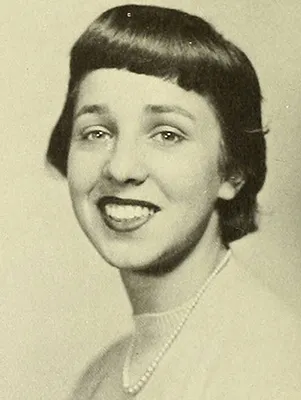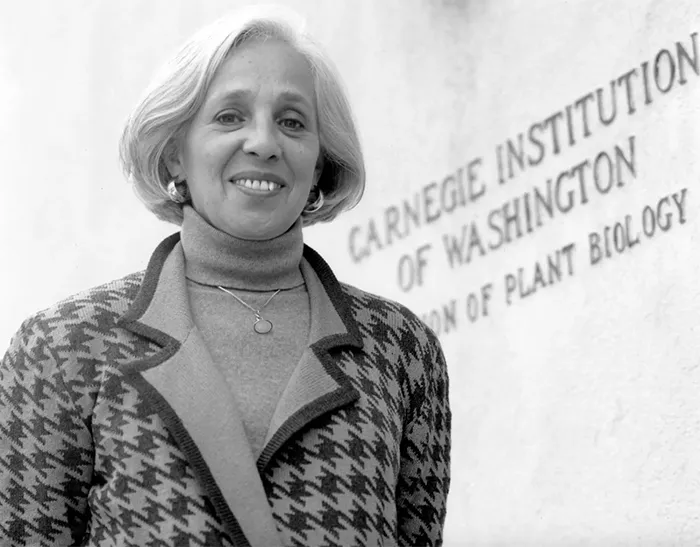In Honor of Pioneering Microbiologist, Science Educator Maxine Frank Singer ’52, H’78

Maxine Frank Singer ’52, H’78 speaks at the opening of the eponymous Singer Hall, one of the very few science buildings named for a woman on an American college campus.
Maxine Frank Singer ’52, H’78, a National Medal of Science recipient renowned for her pioneering research and unwavering dedication to promoting access and inclusion in STEM fields, passed away on July 9 at her home in Washington, D.C. She was 93.
Singer was a groundbreaking molecular biologist whose research is widely admired for its rigor and creativity. Among her myriad, notable achievements, Singer helped to map the inner workings of DNA and led seminal debates in the 1970s that established guidelines for the potential risks and ethical implications of genetic engineering.
The president emerita of Carnegie Science, a nonprofit research center in Washington, Singer was also a renowned science administrator and a leader in science policy, ethics, and advocacy. She championed the cause of women and people of color in science, promoted equal access to postgraduate training and career opportunities, and helped build programs to improve science education in public schools.
Read more in The New York Times and The Washington Post
Originally from Brooklyn, N.Y., Singer graduated from Swarthmore with High Honors in chemistry and biology. In her 2004 essay “The Nurturing of a Scientist” published in The Meaning of Swarthmore, Singer reflected on the ability of women of her own and subsequent generations to find their place in the sciences.

Singer in the 1951 edition of The Halcyon
“Swarthmore has been and remains a place where young women can get an extraordinary start in science,” she said. “Most significantly, the Swarthmore experience prepared me to join the scientific community and sustained me in that community through these long, and never easy, years.”
In 2001, Singer’s family donated a laboratory in her honor to the College’s Science Center.
Her connection to Swarthmore deepened in 2019 when, at the suggestion of the family of Eugene (Gene) Lang ’38, H’81, the College named its new building for engineering, biology, and psychology after her. Singer Hall is one of the very few science buildings named for a woman on an American college campus.
"Maxine's lifelong passion for discovery and her commitment to expanding access to science education embodies Swarthmore's highest ideals," says President Valerie Smith. "Her immeasurable contributions will inspire the scientific community for generations to come."
Born on February 15, 1931, Singer attended public schools in Brooklyn, where her interest in science was first encouraged. After Swarthmore, she earned a Ph.D. in biochemistry from Yale University, specializing in the rare discipline of nucleic acid research.
During her research career, Singer helped to usher in a monumental shift in the biological sciences, through the emergence of the field of molecular biology.
In 1956, she joined the Laboratory of Biochemistry at the National Institutes of Health, where she was part of a small group focused on the emerging field of nucleic acid research. In 1975, she became chief of the Nucleic Acid Enzymology Section at the National Cancer Institute’s Laboratory of Biochemistry, which she went on to lead from 1980 to 1987.
Singer served as president of the Carnegie Institution of Washington, now known as Carnegie Science, from 1988 until 2002, creating the department of global ecology and establishing science education programs for students and teachers in Washington, D.C.
“Singer changed the face of the organization, not only as the first woman to serve in the role, but by spearheading new scientific and educational initiatives with far-reaching impacts,” a tribute from Carnegie Science reads.

Singer served as president of the Carnegie Institution of Washington, now known as Carnegie Science, from 1988 until 2002. Photo courtesy of Carnegie Science.
Singer’s many honors include election to the American Academy of Arts and Sciences and the Pontifical Academy of Sciences. She also received the Public Welfare Medal from the National Academy of Sciences, and an oil painting of her is displayed in the National Portrait Gallery in Washington, D.C.
Singer’s career “represented a rare trifecta of excellence in scientific research, leadership, and public advocacy,” notes Carnegie Science. In 1992, President George H. W. Bush awarded her the National Medal of Science in recognition of “her outstanding scientific accomplishments and her deep concern for the societal responsibility of the scientist.”
Singer died after a battle with chronic obstructive pulmonary disease and emphysema. She is survived by her husband, Daniel Morris Singer ’51, their four children — Amy ’82, Ellen ’83, David, and Stephanie — and several grandchildren.



